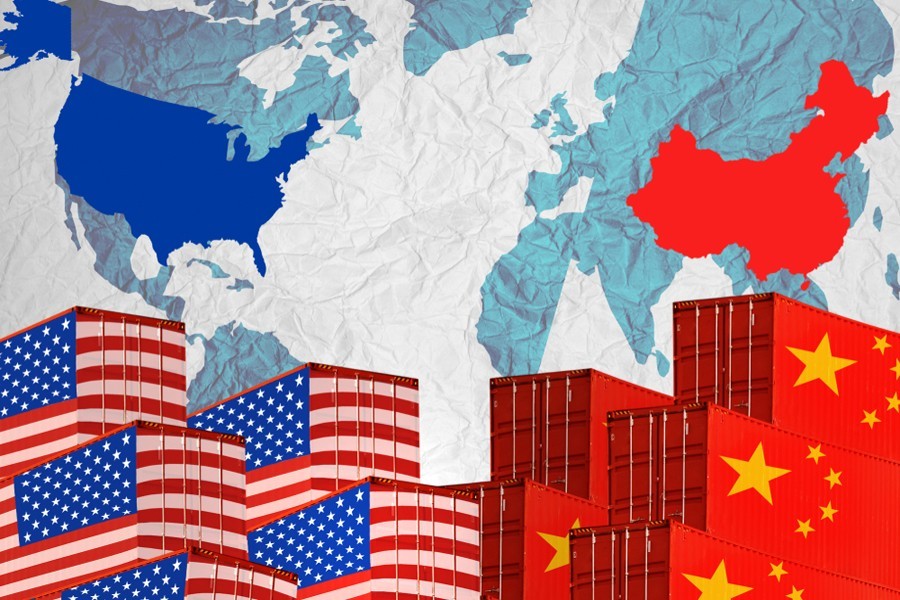The reckless tariff plans of the US that come after China's forced countermeasure tariffs on Friday showed that the US has gone too far and run out of options to save itself from the awkward situation of provoking a trade war, analysts said Saturday.
The further it goes toward a dead end on trade unilateralism, the worse its economy suffers and the more isolated it becomes in the world trade, analysts said.
Starting on October 1, the US will raise tariffs on $250 billion in Chinese goods to 30 per cent from 25 per cent. Starting on September 1, tariffs on another $300 billion in products will be increased to 15 per cent from 10 per cent, US President Donald Trump tweeted on Friday after China announced new tariffs on $75 billion in US goods.
Unlike China's carefully designed countermeasure tariffs that would inflict the maximum pain on the US economy, US' angry response, which is lack of thorough consideration, is a feeble move that risks to drag its economy into recession, but will have limited impacts on China, analysts said.
A large part of the $250 billion goods that would be levied 30 per cent are intermediate and investment products, which will have significant impacts on US companies and production chain, Chen Wenling, chief economist with the China Center for International Economic Exchanges, told the Global Times on Saturday.
A half of the $300 billion products that will be levied 15 per cent tariff are consumer goods, and the new tariff level will put unaffordable price hike on US consumers, which has been proved by US' previous move of postponing tariffs on parts of goods to December, Chen said.
The US has tried all means to escalate the trade war, but its extreme pressure tactic fails to achieve its desired goal of forcing China to give in or reverse the trade deficit, Chen added.
The US trade deficit in 2018 was not reversed after it started the trade war with China, but expanded 12.5 per cent to $621 billion, reaching a ten-year high. Its trade deficit with China hit $419.2 billion. Instead, the US economy is bearing severe pressure from the escalating trade war.
A subtle tipping point of the trade war has been reached, beyond which US new tariff plans will cause more pain on its economy than on China's, and the US stubborn persistence in escalating the trade war will further squeeze out the room for it to use fiscal or monetary policies to stabilise its economy, analysts said.
The data released on Friday showed that US manufacturing PMI (purchasing managers index) was 49.9 in August, below the neutral 50.0 threshold for the first time since September 2009. This is another warning sign of economic recession for the US after the inverted yield curve for US government bonds and the turmoil in its stock market.
The US stock market plummeted on Friday after the world's two largest economies exchanged harsh tariff threats, with the NASDAQ dropping 3.0 per cent, the Dow Jones Industrial Average losing 2.37 per cent and the S&P falling 2.59 per cent.
Shortly after the Chinese tariffs were announced on Friday, Trump tweeted, "Now the Fed can show their stuff," further pressuring the US Federal Reserve to cut interest rates to boost growth amid the domestic downward pressure.
There is already no more room for fiscal measures left for the US to stimulate its economy. The new tariffs will cause prices hike which will further squeeze the room for its monetary policies, said Mei Xinyu, a research fellow at the Chinese Academy of International Trade and Economic Cooperation under the Ministry of Commerce.
The looming economic recession is stirring up a stronger domestic backlash on Trump's trade war, said Gao Lingyun, an expert with the Chinese Academy of Social Sciences.
Trump Friday also ordered US companies to find an "alternative" to operating in China. But the US Chamber of Commerce rebuffed the call, warning against any further escalation of tensions between the two nations.
"Despite our concerns, the 40-year old trade relationship between our two countries has been for the most part productive, constructive, and mutually beneficial. US companies have been ambassadors for positive changes to the Chinese economy that continue to benefit both our people," said Myron Brilliant, the Chamber's executive vice president and head of international affairs.
US trade unilateralism will only further hurt its own economy and push itself away from more economies that support free trade and multilateralism rules, said Gao.
Besides the unreliable entities list, China will not launch more countermeasures for now, Mei predicted, adding that the vast Chinese market will continue to remain open to those that abide by Chinese laws and regulations.


